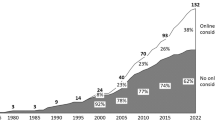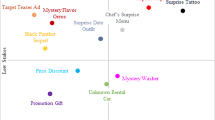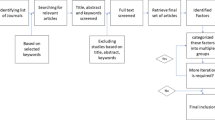Abstract
Four ‘traditional’ market failures are commonly used to justify public interventions to increase economic efficiency: public goods, externalities, natural monopoly, and information asymmetry. Despite the fact that information asymmetry seems to be the rationale for many programs of direct and indirect regulation on behalf of consumers, it is the least conceptually developed of the ‘traditional’ rationales in terms of problem diagnosis and policy prescription. Three questions are important: first, under what conditions does the potential for significant inefficiency due to information asymmetry exist? Second, under what conditions are private responses likely to prevent the inefficiency from being realized? And third, what are the candidate public interventions for reducing any inefficiency that does occur? Drawing on the growing literature on the economics of product quality, this paper provides a framework to help analysts answer these questions.
Similar content being viewed by others
References
Abraham, Kenneth S. (1986), Distributing Risk: Insurance, Legal Theory, and Public Policy. New Haven, Connecticut: Yale University Press.
Akerlof, George (1970), ‘The Market for Lemons: Qualitative Uncertainty and the Market Mechanism,’ Quarterly Journal of Economics, Vol. 84, No. 3, August 1970, pp. 488–500.
Allen, Franklin, ‘Reputation and Product Quality,’ Rand Journal of Economics, Vol. 15, No. 3, Autumn 1984, pp. 311–327.
Arrow, Kenneth J., ‘Uncertainty and the Welfare Economics of Medical Care,’ American Economic Review, Vol. 53, No. 5, December 1963, pp. 941–973.
Arrow, Kenneth J., ‘Risk Perception in Psychology and Economics,’ Economic Inquiry, Vol. 20, No. 1, January 1982, pp. 1–9.
Bardach, Eugene and Robert A. Kagan (1982), Going by the Book: The Problem of Regulatory Unreasonableness. Philadelphia: Temple University Press.
Beales, Howard, Richard Craswell and Steven C. Salop, ‘The Efficient Regulation of Consumer Information,’ Journal of Law and Economics, Vol. 24, No. 3, December 1981, pp. 491–539.
Bond, Eric W., ‘A Direct Test of the “Lemons” Model: The Market for Used Pick-Up Trucks,’ American Economic Review, Vol. 72, No. 4, September1982, pp. 836–840.
Brucks, Merrie, ‘The Effects of Product Class Knowledge on Information Search Behavior,’ Journal of Consumer Research, Vol. 12, No. 1, June 1985, pp. 1–16.
Cooper, Russelland Thomas W. Ross, ‘Product Warranties and Double Moral Hazard,’ Rand Journal of Economics, Vol. 16, No. 1, Spring 1985, pp. 103–113.
Darby, Michael R. and Edi Kami, ‘Free Competition and the Optimal Amount of Fraud,’ Journal of Law and Economics, Vol. 16, No. 1, April 1983, pp. 67–88.
Doron, Gideon (1979), The Smoking Paradox: Public Regulation of the Cigarette Industry. Cambridge, Massachusetts: Abt Books.
Easley, David and Maureen O'Hara, ‘The Economic Role of the Nonprofit Firm,’ Bell Journal of Economics, Vol. 14, No. 2, Autumn 1983, pp. 531–538.
Epstein, Richard A. (1980), Modern Products Liability Law. Westport, Connecticut: Quorum Books.
Fischoff, Baruch, Stephen R. Watson, and Chris Hope, ‘Defining Risk’ Policy Sciences, Vol. 17, No. 2, October 1984, pp. 123–139.
Friedman, Milton (1962), Capitalism and Freedom. Chicago: University of Chicago Press.
Grady, Mark F. (1981), ‘Regulating Information: Advertising Overview,’ In: Kenneth W. Clarkson and Timothey J. Muris (eds), The Federal Trade Commission Since 1970: Economic Regulation and Bureaucratic Behavior. New York: Cambridge University Press, pp. 222–245.
Grossman, Michael, Douglas Coate, and Gregory M. Arluck (1987), ‘Price Sensitivity of Alcohol Beverages in the United States,’ In: H. D. Holder (ed.), Central Issues in Alcohol Abuse Prevention: Strategies for States and Communities. Greenwich, Connecticut: JAI Press, pp. 169–198.
Grossman, Sanford J., ‘The Informational Role of Warranties and Private Disclosure about Product Quality,’ Journal of Law and Economics, Vol. 24, No. 3, December 1981, pp. 461–483.
Hadden, Susan (1986), Read the Label: Reducing the Risk by Providing Information. Boulder, Colorado: Westview Press.
Kahneman, Daniel, Paul Slovic, and Amos Tversky (1982) (eds), Judgment Under Uncertainty: Heuristics and Biases. New York: Cambridge University Press.
Kim, Jae-Cheol, ‘The Market for “Lemons” Reconsidered: A Model of the Used Car Market with Asymmetric Information,’ American Economic Review, Vol. 75, No. 4, September 1985, pp. 836–843.
Klein, Benjamin and Keith B. Leffler, ‘The Role of Market Forces in Assuring Contractural Performance,’ Journal of Political Economy, Vol. 89, No. 4, 1981, pp. 615–641.
Kunreuther, H., R. Ginsberg, L. Miller, P. Sagi, P. Slovic, B. Borkin, and N. Katz (1978), Disaster Insurance Protection: Public Policy Lessons. New York: John Wiley & Sons.
Leland, Hayne E., ‘Quacks, Lemons, and Licensing: A Theory of Minimum Quality Standards, ’ Journal of Political Economy, Vol. 87, No. 6, December 1979, pp. 1328–1346.
Machina, Mark J., ‘Choice Under Uncertainty: Problems Solved and Unsolved,’ Economic Perspectives, Vol. 1, No. 1, Summer 1987, pp. 121–154.
Magat, Wesley A., John W. Payne, and Peter F. Brucato Jr., ‘How Important is Information Format? An Experimental Study of Home Energy Audit Programs,’ Journal of Policy Analysis and Management, Vol. 6, No. 1, Fall 1986, pp. 20–34.
Matthews, Steven and Andrew Postlewaite, ‘Quality Testing and Disclosure,’ Rand Journal of Economics, Vol. 16, No. 3, Autumn 1985, pp. 328–340.
McGuire, Thomas, Richard Nelson and Thomas Spavins, ‘“An Evaluation of Consumer Protection Legislation: The 1962 Drug Amendments”: A Comment,’ Journal of Political Economy, Vol. 83, No. 3, June 1975, pp. 655–661.
Milgrom, Paul and John Roberts, ‘Price and Advertising Signals of Product Quality,’ Journal of Political Economy, Vol. 94, No. 4, August 1986, pp. 796–821.
Nelson, Philip, ‘Information and Consumer Behavior,’ Journal of Political Economy, Vol. 78, No. 2, March/April 1970, pp. 311–329.
Oi, Walter, ‘The Economics of Product Safety,’ Bell Journal of Economics and Management Science, Vol. 4, No. 1, Spring 1973, pp. 3–28.
Palfrey, Thomas and Thomas Romer, ‘Warranties, Performance, and the Resolution of Buyer Seller Disputes,’ Bell Journal of Economics, Vol. 14, No. 1, Spring 1983, pp. 97–117.
Peltzman, Sam, ‘An Evaluation of Consumer Protection Legislation: The 1962 Drug Amendments,’ Journal of Political Economy, Vol. 81, No. 5, September/October 1973, pp. 1049–1091.
Ross, Stephen M., ‘On Legalities and Linguistics: Plain Language Legislation,’ Buffalo Law Review, Vol. 30, No. 2, Spring 1981, pp. 317–363.
Rudd, Joel, ‘The Consumer Information Overload Controversy and Public Policy,’ Policy Studies Review, Vol. 2, No. 3, February 1983, pp. 465–473.
Schoemaker, Paul J. H., ‘The Expected Utility Model: Its Variants, Purposes, Evidence and Limitations,’ Journal of Economic Literature, Vol. 20, No. 2, June 1982, pp. 529–563.
Shapiro, Carl, ‘Optimal Pricing of Experience Goods,’ Bell Journal of Economics, Vol. 14, No. 2, Autumn 1983, pp. 497–507.
Spence, Michael, ‘Consumer Misperception, Product Failure and Producer Liability,’ Review of Economic Studies, Vol. 44, No. 138, October 1977, pp. 561–572.
Stigler, George J., ‘The Economics of Information,’ Journal of Political Economy, Vol. 69, No. 3, June 1961, pp. 213–225.
Sujan, Mita, ‘Consumer Knowledge: Effects on Evaluation Processes Mediating Consumer Judgments,’ Journal of Consumer Research, Vol. 12, No. 1, June 1985, pp. 31–46.
Thomas, Ruth G., ‘Consumer Protection, Education and Information,’ Policy Studies Review, Vol. 2, No. 3, February 1983, pp. 445–454.
Trebilcock, Michael J. and Barry J. Reiter (1982), ‘Licensure in Law,’ In: Robert G. Evans and Michael J. Trebilcock (eds), Lawyers and the Consumer Interest. Toronto: Butterworth and Co., pp. 65–103.
Tversky, Amos and Daniel Kahneman, ‘Judgment under Uncertainty: Heuristics and Biases,’ Science, Vol. 185, 27 September 1974, pp. 1124–1131.
White, William D. and Theodore R. Marmor, ‘New Occupations, Old Demands,’ Journal of Policy Analysis and Management, Vol. 1, No. 2, Winter 1982, pp. 243–256.
Weimar, David L. (1982), ‘Safe - and Available - Drugs,’ In: Robert W. Poole, Jr. (ed.), Instead of Regulation: Alternatives to Federal Regulatory Agencies. Lexington, Massachusetts: Lexington Books, pp. 239–283.
Zaichkowsky, Judith Lynne (1985), ‘Familiarity: Product Use, Involvement or Expertise?’ In: Elizabeth C. Hirshman and Morris B. Holbrook (eds), Advances in Consumer Research Provo, Utah: Association for Consumer Research, pp. 296–299.
Author information
Authors and Affiliations
Rights and permissions
About this article
Cite this article
Vining, A.R., Weimer, D.L. Information asymmetry favoring sellers: a policy framework. Policy Sci 21, 281–303 (1988). https://doi.org/10.1007/BF00138305
Issue Date:
DOI: https://doi.org/10.1007/BF00138305




